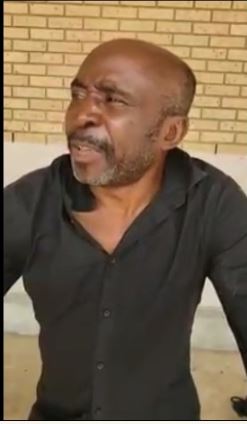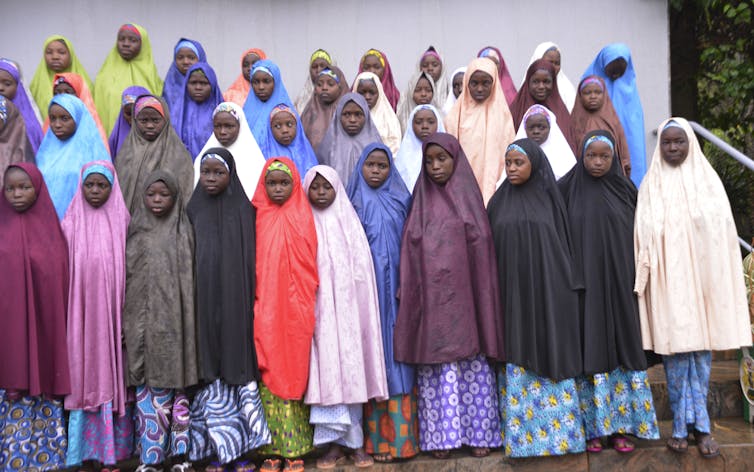He really snatched the teacher wig off LMFAOOOOO

USA & CANADA (901)
Latest News
Thousands of Liberians legally staying in the U.S. face deportation by March 31
Friday, 15 March 2019 14:25 Written by face2faceafricaThousands of Liberians legally resident in the United States under the Deferred Enforced Departure (DED) programme of the U.S. government face imminent deportation by March 31, 2019 when it expires.
The DED was terminated a year ago by the Trump administration which extended it for another year explaining that Liberia is “no longer experiencing armed conflict” and has made “significant progress in restoring stability and democratic governance.”
“Liberia has also concluded reconstruction from prior conflicts, which has contributed significantly to an environment that is able to handle adequately the return of its nationals,” the U.S. government said last year giving the Liberian government time to “reintegrate” its citizens.
However, 50 Members of Congress led by U.S. Senator Jack Reed (D-RI) and U.S. Representative Donald M. Payne, Jr. (NJ-10) have sent a letter to President Trump on March 1, 2019, urging him to reinstate the programme.
“We write to strongly urge you to reinstate Deferred Enforced Departure (DED) for Liberians. We ask that you take this action immediately in order to prevent anxiety and legal uncertainty within our Liberian-American communities,” stated the letter signed by the 50 representatives.
“For more than a quarter of a century the United States has been home to law-abiding and taxpaying Liberians. They have worked hard, played by the rules, and submitted to rigorous vetting. Uprooting them now would be cruel and harmful to them, their families, and employers. We therefore respectfully and urgently request that you reinstate DED for Liberians,” the letter concluded.
Liberians have been eligible for the Temporary Protected Status (TPS) and DED since 1991 as part of the United States’ humanitarian response to Liberia which has been plagued by two brutal and deadly civil wars in 1989 and 1999. More recently, the country was hit by a major Ebola outbreak.
The opportunity allowed some Liberians to live, work, and pay taxes in the country. The programme was extended under President Bill Clinton, George W. Bush and Barack Obama.
In 2018, the Department of Homeland Security stated that there were 839 Liberian citizens in the U.S. working under the Temporary Protected Status (TPS) and Deferred Enforced Departure (DED) programmes.
Earlier this year, Senator Reed introduced the Liberian Refugee Immigration Fairness Act (S. 456), which was also introduced by Congressman David Cicilline (RI-1), to allow eligible Liberians to apply for permanent residency and provide them with a pathway to citizenship.
Liberia was founded in West Africa as a colony in 1822 by freed African-American slaves. The country has since 1864 established diplomatic relations with the United States after it declared independence from the American Colonization Society which facilitated the resettlement.
Published in USA & CANADA
The mental health crisis among America’s youth is real – and staggering
Thursday, 14 March 2019 16:04 Written by theconversationThe first signs of a problem started to emerge around 2014: More young people said they felt overwhelmed and depressed. College counseling centers reported sharp increases in the number of students seeking treatment for mental health issues.
Even as studies were showing increases in symptoms of depression and in suicide among adolescents since 2010, some researchers called the concerns overblown and claimed there simply isn’t enough good data to reach that conclusion.
The idea that there’s an epidemic in anxiety or depression among youth “is simply a myth,” psychiatrist Richard Friedman wrote in The New York Times last year. Others suggested young people were simply more willing to get help when they needed it. Or perhaps counseling centers’ outreach efforts were becoming more effective.
But a new analysis of a large representative survey reinforces what I – and others – have been saying: The epidemic is all too real. In fact, the increase in mental health issues among teens and young adults is nothing short of staggering.
An epidemic of anguish
One of the best ways to find out if mental health issues have increased is to talk to a representative sample of the general population, not just those who seek help. The National Survey on Drug Use and Health, administered by the U.S. Department of Health and Human Services, has done just that.
It surveyed over 600,000 Americans. Recent trends are startling.
From 2009 to 2017, major depression among 20- to 21-year-olds more than doubled, rising from 7 percent to 15 percent. Depression surged 69 percent among 16- to 17-year-olds. Serious psychological distress, which includes feelings of anxiety and hopelessness, jumped 71 percent among 18- to 25-year-olds from 2008 to 2017. Twice as many 22- to 23-year-olds attempted suicide in 2017 compared with 2008, and 55 percent more had suicidal thoughts. The increases were more pronounced among girls and young women. By 2017, one out of five 12- to 17-year-old girls had experienced major depression in the previous year.
Is it possible that young people simply became more willing to admit to mental health problems? My co-authors and I tried to address this possibility by analyzing data on actual suicide rates collected by the Centers for Disease Control and Prevention. Suicide is a behavior, so changes in suicide rates can’t be caused by more willingness to admit to issues.
Tragically, suicide also jumped during the period. For example, the suicide rate among 18- to 19-year-olds climbed 56 percent from 2008 to 2017. Other behaviors related to depression have also increased, including emergency department admissions for self-harm, such as cutting, as well as hospital admissions for suicidal thoughts and suicide attempts.
The large increases in mental health issues in the National Survey on Drug Use and Health appeared almost exclusively among teens and young adults, with less change among Americans ages 26 and over. Even after statistically controlling for the influences of age and year, we found that depression, distress and suicidal thoughts were much higher among those born in the mid- to late-1990s, the generation I call iGen.
The mental health crisis seems to be a generational issue, not something that affects Americans of all ages. And that, more than anything else, might help researchers figure out why it’s happening.
The shift in social life
It’s always difficult to determine the causes behind trends, but some possibilities seem less likely than others.
A troubled economy and job loss, two typical culprits of mental stress, don’t appear to be to blame. That’s because U.S. economic growth was strong and the unemployment rate dropped significantly from 2011 to 2017, when mental health issues were rising the most.
It’s unlikely that academic pressure was the cause, as iGen teens spent less time on homework on average than teens did in the 1990s.
Although the increase in mental health issues occurred around the same time as the opioid epidemic, that crisis seemed to almost exclusively affect adults older than 25.
But there was one societal shift over the past decade that influenced the lives of today’s teens and young adults more than any other generation: the spread of smartphones and digital media like social media, texting and gaming.
While older people use these technologies as well, younger people adopted them more quickly and completely, and the impact on their social lives was more pronounced. In fact, it has drastically restructured their daily lives.
Compared with their predecessors, teens today spend less time with their friends in personand more time communicating electronically, which study after study has found is associated with mental health issues.
No matter the cause, the rise in mental health issues among teens and young adults deserves attention, not a dismissal as a “myth.” With more young people suffering – including more attempting suicide and more taking their own lives – the mental health crisis among American young people can no longer be ignored.
Author: Jean Twenge: Professor of Psychology, San Diego State University
Credit link:https://theconversation.com/the-mental-health-crisis-among-americas-youth-is-real-and-staggering-113239<iframe src="https://counter.theconversation.com/content/113239/count.gif?distributor=republish-lightbox-advanced" width="1" height="1"></iframe>
Published in USA & CANADA
Homeless Nigerian Man Rescued From The Streets In Houston, US (Photos)
Thursday, 14 March 2019 05:43 Written by tori.ng Help has come the way of a sick Nigerian man who has been homeless and stranded in Houston, United States of America.

Emmanuel
The man's plight was brought to social media after Nigerian entertainer who is based in America, Chinomso Prince Egbuchere, spotted him laying on the ground in Houston.
The man identified as Emmanuel who hails from Mbaise in Imo state, revealed he has been in the US for 35 years now and has been suffering from various illnesses including swollen legs due to diabetes.
He said he couldn't do anything about it due to financial incapability. He also claimed he has a son there who is not cooperative and that he wants to return to Nigeria but doesn't know how.
The Mbaise community in Houston, after hearing of his case, mobilized themselves and rushed the homeless man to the hospital for treatment.
Efforts are also being made to find a home for the man or help him return to Nigeria if he makes up his mind among other assistance the community offered him.



Published in USA & CANADA
So sad - Family of Five Including 9-month-old Baby Killed In Ethiopian Airline Crash (Photo)
Wednesday, 13 March 2019 14:46 Written by tori.ngA photo of a family of five including their 9-month-old baby killed in the fatal Ethiopian airline crash has been revealed.

The little child that survived
One of the youngest victims of a tragic Ethiopian Airlines crash that killed 157 people Sunday is nine-month-old Rubi Wangui Njuguna, who was heading from her family’s home in Hamilton to Kenya to meet her grandfather for the first time this Easter.
The grandfather, Quindos Karanja, says Rubi’s 60-year-old grandmother, Ann Wangui Karanja, was also on the flight — as was Rubi’s 34-year-old mother, Carolyne Karanja, her seven-year-old brother Ryan, and her sister Kelly, who was four.
Rubi was the only Canadian citizen in the family.
Quindos Karanja said the family was on its way back to Kenya to see him. On Tuesday, the 60-year-old retired school teacher was trying to come to terms with the shock of losing so many loved ones.
“We don’t know what’s next,” he said in a telephone interview from Kenya.
The Ethiopian Airlines plane went down moments after takeoff from Addis Ababa’s airport Sunday, killing all 157 passengers and crew on board, including 18 Canadians.
Carolyne, a Kenyan, had applied to be a permanent resident in Canada. Ann Karanja travelled to Canada for a visit in August and was supposed to be there for three months but had extended her stay.
The grandfather said he knows he has to be strong and accept reality, but he doesn’t know how to do that. “It’s just hard to accept that this has happened. I feel so much loss. And pain. I’m lonely.”
Published in USA & CANADA
Popular News
felicilin at 20-11-2024 09:47 AM (6 hrs ago) (f) …
Manhattan prosecutors have announced they will oppose President-elect Trump’s…
A spokesperson for the McGill University Health Centre (MUHC) says…
Former US President and Republican candidate, Donald Trump said he…
Disrespectful Student Snatches His Teacher's Wig In Front Of Classmates (Video)
Wednesday, 13 March 2019 04:38 Written by tori.ng A student left his teacher totally embarrassed after snatching her wig from her head in front of the whole class.
Published in USA & CANADA
Once captives of Boko Haram, these students are finding new meaning in their lives in Pennsylvania
Monday, 11 March 2019 00:34 Written by theconversationOf all the challenges faced by people who’ve been displaced, perhaps none is more important than to find new meaning in their lives. And so it is with the four young women who are students in a college prep class that I teach at Dickinson College.
All four students were among the more than 200 Chibok schoolgirls who were abducted by Boko Haram in April 2014. The kidnapping triggered international outrage and prompted the worldwide #BringBackOurGirls campaign.
As we approach the five-year anniversary of the kidnapping of the Chibok schoolgirls – many of whom are still being held captive – it is worth taking a look at what the world has done to help those who have survived the ordeal. The Nigerian government has secured the release of less than half of the kidnapped schoolgirls, with at least 100 still being held captive.
The class I teach at Dickinson offers a small glimpse into the kidnapped Chibok schoolgirls’ lives. It is an outcome that their captors in Boko Haram – a terrorist group whose name means “Western education is forbidden” – never wanted to imagine.
Over the past year or so, the four students I teach have worked hard to achieve their dream of obtaining a high school equivalency diploma so they can have a shot at college. They have attempted the GED practice test and real tests quite a few times.
Assessors said it would take about five to seven years to get them ready for college. However, something took place in February that leads me to believe it won’t take that long. But before I tell that story, a little background is in order.
Escaping captivity
While the Chibok school kidnapping is widely associated with the #BringBackOurGirls campaign, fortunately, my students never had to be “brought back.” That’s because they were among the lucky ones who escaped from the insurgent group as they were being taken to the Sambisa Forest in Nigeria.

How the four young women came to be my students at a small, historic, private liberal arts college in Pennsylvania is a long and complicated story. Not all of it has been pleasant. The Wall Street Journal told much of their rough ordeal in the United States in 2018.
That same year, Dickinson College president Margee Ensign was asked and agreed to welcome the young women to our campus. She had done the same a few years earlier with some of the kidnapped Chibok schoolgirls when she was head of the American University of Nigeria, where I also used to teach.
The students are all on full scholarship funded by the Nigerian government’s Victim Support Fund and the Murtala Mohammed Foundation.
Journey to the United States
I came to Dickinson College in the fall of 2017 as a visiting professor in international studies. I first met the four former Chibok schoolgirls in April 2018, when Dickinson launched the College Bridge program in which they are now enrolled.
Through the program, the young women take a college prep class with me that focuses on critical and analytical thinking skills. They also take math, English, science, social studies and GED preparatory classes.
A global mission, challenging work
In many ways, the bridge program at Dickinson is in line with UNESCO’s new #RightToEducation campaign that is meant to expand access to higher education for refugees. According to the United Nations High Commission for Refugees, among the world’s 16.1 million refugees, only 1 percent of college-aged refugees attend university, compared to 34 percent of all college-aged youth globally.

The work of preparing students with refugee backgrounds for college is far from easy. Aside from adjusting to a new culture and environment, sometimes a new language and a different method of learning, displaced persons struggle to find new meanings in their displacement. When education becomes their main pursuit, it must necessarily provide those new meanings.
A breakthrough
For a student named Patience, new meaning has been found in her quest to become a schoolteacher or counselor. Patience has taken a significant step toward that goal. It came to light when she showed up over an hour late to my class one day in February.
“What happened today?” I asked when she walked in, trying to keep my voice and expression from revealing my disappointment.
“I went to take my GED Math this morning. I told you,” she said.
I’m not sure how I forgot that she was going to take the GED Math, but I did. Had I remembered, I would have sent her one of my motivational texts to get her inspired. This was her third attempt on the GED.
“How did it go?” I asked.
“It went well,” she answered, her voice flat, face emotionless.
“So …” I stammered, “did you pass?”
“Yes, I did,” she said, and then told me her score. The whole class erupted in cheers and claps. I was so excited, I rushed and hugged her without thinking. The other students joined. It was one of the most rewarding moments in my decade of teaching. A few weeks later, Patience passed her GED Science exam as well.
Inspiring others
Patience is the first among the four women to pass a GED test. In order to appreciate what a big deal this is, consider where these young women have come from.
Beyond having had a tumultuous life, the students come from an unimaginably poor educational background. The Government Girls Secondary School they attended in Chibok, Borno state, is in a very remote part of Nigeria. You normally wouldn’t have good teachers in such remote areas. But with the Boko Haram insurgency that has plagued the region for the past decade, the situation is far worse. The insurgency has prompted most of the good teachers to leave. According to Human Rights Watch, at least 611 teachers have been deliberately killed by the insurgents since 2009, forcing a further 19,000 teachers to flee. The students have told me that their school at Chibok did not have qualified science, math or language teachers. Their science labs had no equipment.
The Borno state Ministry of Education and many other states in northern Nigeria generally do not prioritize education for girls due to religion and culture, which both support early marriage. In Borno state, the attendance rate for female secondary school students is 29 percent, compared with a national average of 53 percent. So this is a huge achievement for Patience and the other women in their journey toward college. When they eventually get into college, I believe it will inspire thousands of other young girls from that region of the world.
For her part, Patience hopes to inspire girls worldwide.
I know this because in early 2019, I worked with Patience and her fellow students on listening and comprehension skills. For one exercise, I had them watch and then write their opinion about this inspiring talk by Mary Maker, a former South Sudanese refugee who is now a teacher at a school in Kenya’s Kakuma Refugee Camp, on the power of education for women from crises societies.
Patience and the others could relate very easily with the speech and with the speaker. It spoke to their past and their present, their hopes and aspirations. The proof is that in her essay about the video, Patience wrote that she wants to have a voice like Mary Maker’s – and to speak for women who cannot speak for themselves.
Author: Jacob Udo-Udo Jacob: Visiting International Scholar in International Studies & Political Science, Dickinson College
Credit link: https://theconversation.com/once-captives-of-boko-haram-these-students-are-finding-new-meaning-in-their-lives-in-pennsylvania-106302<iframesrc="https://counter.theconversation.com/content/106302/count.gif?distributor=republish-lightbox-advanced" width="1" height="1"></iframe>
Published in USA & CANADA
Nigerian Lady and her mother-in-law clash as husband films (Video)
Saturday, 09 March 2019 19:25 Written by esabod. A Nigerian lady was filmed while attacking her mother-in-law with insults following a disagreement between them. In the video which was allegedly recorded by the husband, the young lady can be seen lashing out on her mother-in-law and hurling insults at her during the heated clash which happened abroad.
The wife even went to the extent of threatening to beat the mother-in-law if she mistakenly touches her.
Many Nigerians have berated the wife for insulting the elderly woman while the husband was not also left out in the criticism for allegedly recording the incident rather than pacify both parties.
Watch the video below.
Published in USA & CANADA
UNEMPLOYED MAN WINS $273M LOTTO MONTHS AFTER DIVORCE IN US, EX-WIFE REACTS
Saturday, 09 March 2019 01:54 Written by diasporareporters.The ex-wife of an unemployed New Jersey man who just claimed his $273 million Mega Millions jackpot told the New York Post on Thursday that she has no plans to reunite with her ex despite his new-found wealth.
“He’s not appealing to me all of a sudden because he has this money,” Eileen Murray told the paper.
According to Fox News, The couple was married for 15 years until they divorced last October. She told the Post that she paid spousal support and continues to make payments.
“I’m not going after anything. I have morals. I know what I’ve worked for and its everything that I have,” she said.
Murray also said she doesn’t think her ex-husband will reach out to offer her any of the cash, but hopes he “does the right thing.”
“Think about it. How long did I work? How long did I support him? I had to give him a lot of money in the divorce,” Murray said. “You tell me what’s the moral thing to do.”
Murray’s ex-husband said he’d been actively searching for a job over the last year but never received an interview, the Daily Mail reported.
He said he left his two tickets he purchased at the store and a “good Samaritan” reportedly handed them over to the clerk.
“I’m looking for the guy that handed them in,” Weirsky told the Mail. “I’m gonna give him something.”
Published in USA & CANADA







